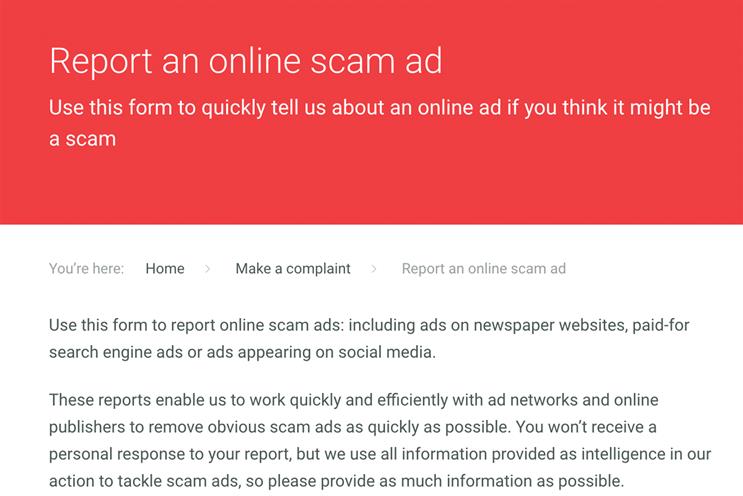
The Advertising Standards Authority is today launching a UK Scam Ad Alert system to help tackle fraudulent advertising on online platforms and social media.
It was developed alongside the Internet Advertising Bureau UK, Britain’s digital advertising trade body, and in partnership with Facebook and Google, which respectively dominate social media and search/display advertising.
The tool follows a three-month trial that began in January in which the ASA enabled people to alert platforms and some publishers in helping to remove fraudulent paid-for ads.
The participating platforms are Facebook/Instagram, Google, Twitter, Snap, TikTok, Microsoft, Verizon, Taboola and Outbrain. Reach also receives all the alerts, but it is a publisher rather than a platform.
Scam ads, particularly those promoting get-rich-quick schemes involving cryptocurrency such as Bitcoin, are still being published despite considerable media attention in recent years. They commonly present themselves as news stories or features and use doctored pictures of celebrities to imply those people are endorsing the service.
In 2019, the Financial Conduct Authority and Action Fraud warned that victims of cryptocurrency and foreign exchange investment scams had lost more than £27m during the previous financial year.
Importantly, the ASA is simply facilitating complaints about scam ads, so people may not expect a response or any notification that their complaint has been dealt with.
An ASA spokesman said the benefit of the body's involvement is that the alert system shares intelligence with all the platforms taking part in the scheme (as opposed to each company only knowing about complaints made to them directly).
The ASA said, once notified, it will promptly send an alert to all participating platforms with details about the scam ad and when it appeared on a platform or publisher’s website. It told ±±ľ©Čüłµpk10 that it will aim to alert platforms within 24 hours and then those responsible for serving the ad would need to provide assurances (of ad removal) within 48 hours. During the trial period, the spokesman added, the platforms stuck to that timeframe with very few exceptions.
Facebook and Google have taken steps to crack down on scam ads in the past year. In July 2019, Facebook announced that it would launch an anti-scam tool as part of its legal settlement with broadcaster Martin Lewis, whose face and name were used to mislead people. In April, Google said it would introduce identity verification for advertisers "in the following years".
This scam ad that is appearing as the welcome banner in my feed now uses Meghan and Harry, and brands to flog a Bitcoin get-rich-quick scheme
— Omar Oakes ? (@OmarOakes)
One scam advertiser, Bitcoin Trader, was found in 2018 to have featuring celebrities, such as the Duke and Duchess of Sussex. ±±ľ©Čüłµpk10 discovered that this execution was still running on YouTube and Duolingo in March.
Guy Parker, chief executive of the ASA, said: "The overwhelming majority of ads responsibly inform and entertain their audience, but a small minority are published with criminal intent. Our Scam Ad Alert system will play an important part in helping detect and disrupt these types of scams."


